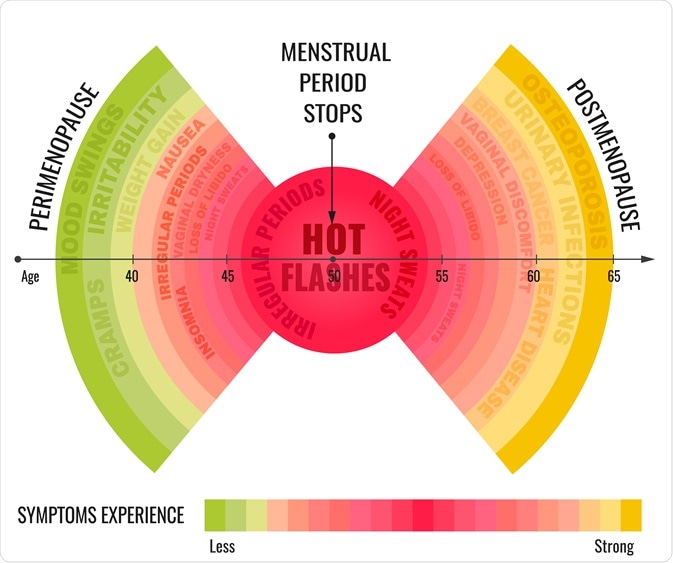Perimenopause means “around menopause” or the transition phase that starts many years before menopause. It’s the stage when the ovaries start to produce less estrogen. Usually, perimenopause kickstarts when a woman reaches her 40s.
 Image Credits: Double Brain / Shutterstock.com
Image Credits: Double Brain / Shutterstock.com
Perimenopause can last up until menopause, which means the ovaries have stopped releasing eggs. It’s a couple of months or years before menopause that women experience a wide range of premenopausal symptoms, including irregular periods, sleep problems, hot flashes, mood changes, decreasing fertility, vaginal and bladder problems, decreased sexual function, decreasing fertility, loss of bone mass, and fluctuating cholesterol levels.
Body changes during perimenopause
Many women worry about how their bodies will change when they reach menopause. But, they don’t realize that years before the onset of menopause, their bodies go through perimenopause, which is considered the change before the change.
The physical changes linked to perimenopause stem from hormonal changes and alternations, particularly the levels of circulating estrogen. Estrogen is a female hormone that has many significant roles in the body. Though the primary function of estrogen is to develop female secondary sexual characteristics, there is more to it than what meets the eye.
Estrogen plays a vital role in stimulating the growth of the uterine inner lining called the endometrium during the menstrual cycle. Plus, it also helps lubricate the vagina, and at the same time thicken its wall. Estrogen also helps in increasing bone formation, which is why menopausal and postmenopausal women are at a higher risk of developing osteoporosis.
The hormone also affects mental health since women may experience significant mood lowering secondary to a sudden decrease in estrogen levels in the body. After giving birth, during perimenopause and after menopause, there are low levels of estrogen, which may lead to depression.
Estrogen is an important hormone in maintaining healthy and moist skin. Low levels of estrogen lead to dry skin. Lastly, low estrogen levels may increase the risk of developing cardiovascular disease and may increase the likelihood of developing atherosclerosis, a condition that heightens the chances of having a heart attack, a stroke, and high blood pressure.
Perimenopause and diet
During perimenopause, it’s common to experience a wide range of symptoms. It’s important for women to manage these symptoms through lifestyle modifications. It’s during the perimenopause phase that the body starts to change, including weight gain in women in their 40s.
 Image Credits: Tatiana Bralnina / Shutterstock.com
Image Credits: Tatiana Bralnina / Shutterstock.com
Making healthy food choices, staying away from smoking or drinking alcohol, engaging in regular exercise, and sleeping properly are some of the ways you can manage your symptoms during this stage.
For instance, during perimenopause, women experience hot flushes due to fluctuations in hormonal levels. One of the ways to manage this symptom through diet is limiting alcohol, caffeine, and sugar in the diet, as they can all exacerbate any hormonal symptoms.
There are ways to boost energy, have a stable blood glucose level, and maintain weight during perimenopause, including eating more fruits and vegetables, while adding lean protein. Women should steer away from fast food and processed food.
Adding whole grains to the diet, such as brown rice, wheat bread, and oatmeal can help prevent weight gain and have the energy to go through the day. Since the bones begin to weaken during perimenopause, adding calcium-rich foods in the diet is also important, such as yogurt, cheese, milk, dairy products, and canned sardines.
Eating foods rich in omega-3 is also crucial to promote health during the perimenopausal years. Happy brain chemistry relies on getting the proper amounts of omega-3 in the diet. It reduces mood swings and can reduce the risk of developing depression.
Add more proteins in the diet through legumes, which are also high in fiber. Legumes can help maintain blood sugar levels. Aside from that, legumes are low in calories, which helps women maintain a healthy weight during their perimenopausal years.
Engaging in regular exercise and physical activity is vital for perimenopausal women. They should move more and sit less and engage in moderate exercise for about 150 minutes per week, as recommended by the American Heart Association (AHA).
Further Reading
- All Menopause Content
- What is Menopause?
- Causes of Menopause
- What Should I Eat During Menopause?
- Menopause Symptoms
Last Updated: Apr 16, 2020

Written by
Angela Betsaida B. Laguipo
Angela is a nurse by profession and a writer by heart. She graduated with honors (Cum Laude) for her Bachelor of Nursing degree at the University of Baguio, Philippines. She is currently completing her Master's Degree where she specialized in Maternal and Child Nursing and worked as a clinical instructor and educator in the School of Nursing at the University of Baguio.
Source: Read Full Article
